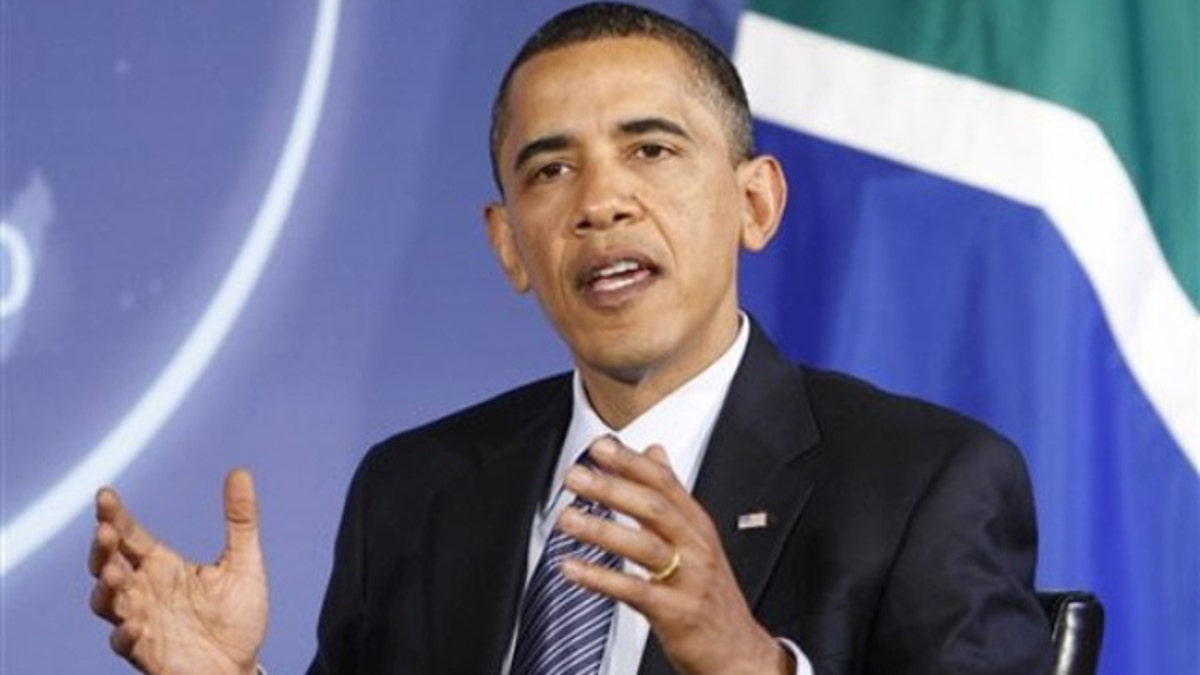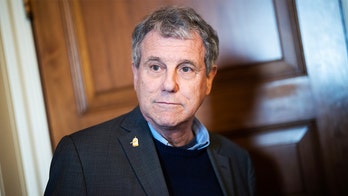
President Obama speaks to members of the media during his meeting with South Africa's President Jacob Zuma, in advance of the Nuclear Security Summit, at Blair House in Washington, Sunday, April 11, 2010.(AP)
In a rare divergence from administration policy, President Obama used the term "radical Islam" to describe the African-based terror group that took credit Monday for killing 74 people in Uganda during an interview Tuesday with the South African Broadcasting Corporation.
The interview came just three months after the administration removed such religious terms from its national security playbook and two months after Attorney General Eric Holder hesitated to link "radical Islam" to recent terror attacks and plots in the U.S. during questioning at a House Judiciary Committee hearing.
When asked about opinions attributing radical Islam's impact on the development and stability on the African continent, Obama called Islam "a great religion," but added that the radical version views as anti-Islam "any efforts to modernize, any efforts to provide basic human rights, any efforts to democratize."
"And I think that is absolutely wrong," he said. "I think the vast majority of people of the Islamic faith reject that. I think the people of Africa reject it."
Obama also accused terror groups such as Al Qaeda an Al Shabab of being racist.
"What you've seen in some of the statements that have been made by these terrorist organizations is that they do not regard African life as valuable in and of itself," he said. "They see it as a potential place where you can carry out ideological battles that kill innocents without regard to long-term consequences for their short-term tactical gains."
An administration official explained that these terror groups have shown their racism through different actions including the 1998 embassy bombings in which hundreds of Africans were killed and thousands more were wounded in an effort to attack American embassies, and Monday's attack that came on the same day that Africa was celebrating its achievement of hosting a successful World Cup
The official also noted that U.S. intelligence indicates that Al Qaeda leadership specifically targets and recruits black Africans to become homicide bombers because they believe that poor economic and social conditions make them more susceptible to recruitment than Arabs. And that Al Qaeda recruits have accused the organization of racism against West African blacks because they are only used in lower-level operations.
"In short, Al Qaeda is a racist organization that treats black Africans like cannon fodder and does not value human life," the official said.
In April, Obama's advisers said they would scrub religious terms such as "Islamic extremism" from the central document outlining the U.S. national security strategy and rewrite it to emphasize that the U.S. does not view Muslim nations through the lens of terror.
That change stood in stark contrast to the Bush Doctrine of preventive war that stated" The struggle against militant Islamic radicalism is the great ideological conflict of the early years of the 21st century."
In May, Holder refused to acknowledge whether radical Islam influenced the Fort Hood shooting last November, the failed Christmas Day bombing last December and the botched Times Square attack this year.
"There are a variety of reasons why I think people have taken these actions," Holder told Rep. Lamar Smith, R-Texas, the ranking member of the House Judiciary Committee.
After being pressed by Smith to acknowledge that radical Islam may have been a factor, Holder finally said, "I certainly think that it's possible that people who espouse a radical version of Islam have had an ability to have an impact on people like Mr. Shahzad." That was a reference to Faisal Shahzad, who pleaded guilty last month to trying to blow up a car in Times Square on May 1 and to receiving terror training from the Pakistani Taliban.
On Tuesday, Obama said the U.S. aims to help Africa provide more freedoms and establish strong democracies to help break the back of terrorism.
"There's obviously young people, if they don't have opportunity, are more vulnerable to these misguided ideologies, but we also have to directly confront the fact that issues like an anti-Democratic, anti-free speech, anti-freedom of religion agenda, which is what an organization like Al Shabab promotes, also often goes hand in hand with violence," he said.




